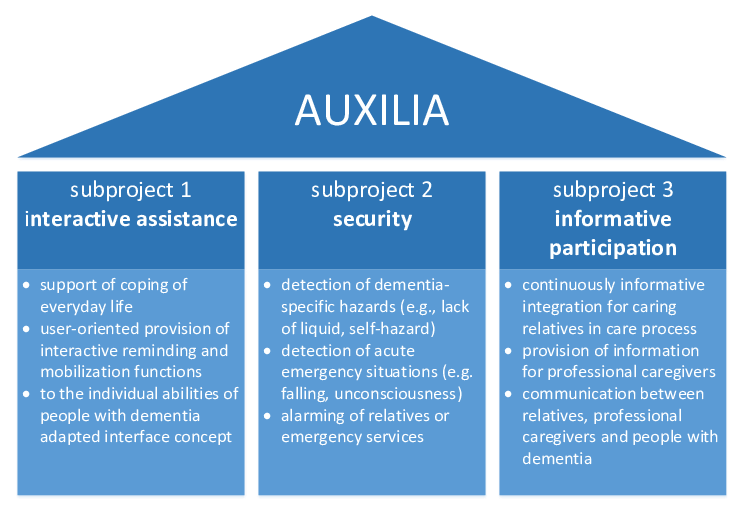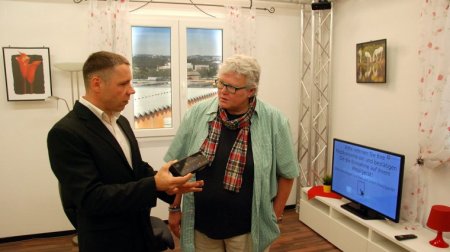AUXILIA - An User-Centered Assistance and Safety System for Supporting People with Dementia based on Intelligent Behavioral Analysis
Concept of the Project AUXILIA
Based on the gained knowledge of Saxony’s care needs a concept of the project for the improvement of the situation in care was developed. Beside the scientific-technical innovation planned subprojects, e.g. the implementation as an interactive assistance-system or increasing the safety for all user groups were considered.
What are the goals of the project?
The goal of the Project AUXILIA is the enabling of longer, self-determined Life for people with dementia in their own homes using a novel assistive technology. This is motivated particularly by the high social, societal and economic importance. Comparing to the project “OPDEMIVA” (state of technology) the practice-oriented implementation of such a system is focused.
The previously in OPDEMIVA under laboratory conditions obtained and validated technical approaches for assistance of people with dementia are now placed in an application as practical assistance system. As part of the project we offer a real added value for all target groups for both scientific-technical innovation and further investigations to the practical suitability of the system.
In terms of user-centricity a system is to be created, which is able to deal with different functions for equally support people with dementia, caring relatives and people from professional care. Based on the analysis of the needs of the different user-groups the goals for the individual requirements need to be considered.
By taking into account the technical feasibility and the scope of the anticipated positive effects three key aspects were to be considered:
- Improvement of the quality of living by strengthening independence and staying longer in own homes for people with dementia
- Relief of caring relatives regarding temporal, psychological and moral burdens
- Discharge of the professional caregivers and optimization of the care process by the provision of additional, valid information for the improvement of the quality of individual care
How do we implement the project objectives?
In order to achieve the project objectives, a technical system for registration of the individual daily routine of people with dementia will be developed. The various stakeholders can be supported by a couple of functions, which will be realized in the project AUXILIA. This includes an interactive reminder and mobilization assistant. Furthermore, an interaction-concept adapted to the dementia- specific abilities gets Attention. The reliable detection of dangerous situations as well as the immediate Alert in case of emergency is another important component of the project. The detection of dangerous situations is divided into two parts – the emergency situations based on dementia- specific hazards and the detection of acute emergencies, respectively. By a successful implementation of using the results of the detection-process people with dementia are getting a higher wellbeing and the caring relatives get a better feeling of security. Help can immediately have communicated, without actively called afterwards. This function represents a significant additional benefit compared to existing house emergency call systems, which are already very good accepted by the potential user-groups and correspond to a technique as state of the art.
Finally, the individual care is to be improved by the accessibility of useful additional information. For example, the dementia person has a disturbed day-night rhythm, this is identifiable by the interface and can be considered as a valid information in the care process. As shown in the following figure, the project AUXILIA is divided into subprojects interactive assistance, security and the informative participation.

Press (german)
Mitteilungen der Universität
-
Forschung
 Vom Labor in die Praxis: Technische Hilfe für Demenzkranke
Vom Labor in die Praxis: Technische Hilfe für Demenzkranke Elektrotechniker der TU Chemnitz wollen ein im Labor entwickeltes Smart-Sensor-Netzwerk, das die Pflege von Menschen mit Demenz unterstützen soll, in praxistaugliche Assistenzsysteme überführen
AUXILIA in den Medien
| 23.05.2017 | investEU | Support for people with dementia in their own home |
| 27.07.2016 | Freie Presse | Moderne Technik soll Leben von Demenzkranken erleichtern |
| 26.07.2016 | MDR | Trotz Demenz in den eigenen vier Wänden leben |
Publications
| Title | Author(s) | Year | |
|---|---|---|---|
| 1 | Unsupervised Domain Adaptation from Synthetic to Real Images for Anchorless Object Detection
16th International Joint Conference on Computer Vision, Imaging and Computer Graphics Theory and Applications - Volume 5: VISAPP, 08.02.2021 - 10.02.2021, pages 319-327. - SCITEPRESS - Science and Technology Publications, 2021 |
Scheck, Tobias Perez Grassi, Ana Cecilia Hirtz, Gangolf |
2021 |
| 2 | A Study on the Influence of Omnidirectional Distortion on CNN-based Stereo Vision
16th International Joint Conference on Computer Vision, Imaging and Computer Graphics Theory and Applications, 08.02.2021 - 10.02.2021, Online-Konferenz, pp. 809-816. - Setúbal, Portugal : SCITEPRESS - Science and Technology Publications, 2021 |
Seuffert, Julian Perez Grassi, Ana Cecilia Scheck, Tobias Hirtz, Gangolf |
2021 |
| 3 | Contactless Interactive Fall Detection and Sleep Quality Estimation for Supporting Elderly with Incipient Dementia
In: Current Directions in Biomedical Engineering. - Berlin, Boston : De Gruyter. - 6. 2020, 3, S. 388 - 391 |
Seidel, Roman Scheck, Tobias Perez Grassi, Ana Cecilia Seuffert, Julian Apitzsch, André Yu, Jingrui Nestler, Norbert Heinz, Danny Lehmann, Lars Goy, Anne Hirtz, Gangolf |
2020 |
| 4 | Learning from THEODORE: A Synthetic Omnidirectional Top-View Indoor Dataset for Deep Transfer Learning
2020 IEEE Winter Conference on Applications of Computer Vision (WACV), Snowmass Village, CO, USA, 1-5 March 2020, pp. 932-941. - IEEE, 2020 |
Scheck, Tobias Seidel, Roman Hirtz, Gangolf |
2020 |
| 5 | A CNN-based Feature Space for Semi-supervised Incremental Learning in Assisted Living Applications
15th International Joint Conference on Computer Vision, Imaging and Computer Graphics Theory and Applications - Volume 5: VISAPP, Pages 217-224. - SCITEPRESS - Science and Technology Publications, 2020 |
Scheck, Tobias Perez Grassi, Ana Cecilia Hirtz, Gangolf |
2020 |
| 6 | Nutzerzentriertes Assistenz - und Sicherheitssystem zur Unterstützung von Menschen mit Demenz auf Basis intelligenter Verhaltensanalyse
65. Frühjahrskongress der Gesellschaft für Arbeitswissenschaft e.V., 27.02.2019 bis 01.03.2019, Dresden, Deutschland. - Dortmund : GfA-Press, 2019 |
Goy, Anne Dittrich, Frank Bullinger, Angelika C. |
2019 |
| 7 | Practice-oriented Development of a User-centered Assistance and Safety System for Supporting People with Dementia
Human Factors and Ergonomics Society Europe Chapter 2019 Annual Conference, 02.-04.10.2019, Nantes, Frankreich, 2019 |
Goy, Anne Dittrich, Frank Bullinger, Angelika C. |
2019 |
| 8 | OmniPD: One-Step Person Detection in Top-View Omnidirectional Indoor Scenes
In: Current Directions in Biomedical Engineering. - Walter de Gruyter GmbH. - 5. 2019, 1, S. 239 - 244 |
Yu, Jingrui Seidel, Roman Hirtz, Gangolf |
2019 |
| 9 | Improved Person Detection on Omnidirectional Images with Non-maxima Suppression
14th International Joint Conference on Computer Vision, Imaging and Computer Graphics Theory and Applications - Volume 5: VISAPP, Prag, 25.02.19-27.02.19, pages 474-481. - SCITEPRESS - Science and Technology Publications, 2019 |
Seidel, Roman Apitzsch, André Hirtz, Gangolf |
2019 |
| 10 | Technisch-pflegerische Herausforderungen bei der Entwicklung des Assistenz- und Sicherheitssystems AUXILIA für Menschen mit beginnender Demenz
AAL Wissenschaftskongress Karlsruhe 2018, 11. und 12. Oktober 2018, S. 30 - 31 |
Seidel, Roman Apitzsch, André Yu, Jingrui Seuffert, Julian Nestler, Norbert Heinz, Danny Goy, Anne Hirtz, Gangolf |
2018 |
| 11 | Strukturierte Bedürfnisanalyse im Rahmen der nutzerzentrierten Entwicklung eines Assistenz- und Sicherheitssystems für Menschen mit beginnender Demenz
Active Assisted Living Wissenschaftskongress 2018, 11.10. 2018 bis 12.10.2018, Karlsruhe, S. 55-56 |
Goy, Anne Dittrich, Frank Seidel, Roman |
2018 |
| 12 | AUXILIA - Nutzerzentriertes Assistenz- und Sicherheitssystem zur Unterstützung von Menschen mit Demenz auf Basis intelligenter Verhaltensanalyse
innteract2018, 28.06.-29.06.2018, Chemnitz, 6 Seiten |
Seidel, Roman Apitzsch, André Yu, Jingrui Seuffert, Julian Nestler, Norbert Heinz, Danny Goy, Anne Hirtz, Gangolf |
2018 |
| 13 | Nutzerzentriertes Assistenz- und Sicherheitssystem zur Unterstützung von Menschen mit Demenz auf Basis intelligenter Verhaltensanalyse
Digitale Transformation von Dienstleistungen im Gesundheitswesen IV Impulse für die Pflegeorganisation. - Wiesbaden : Springer Fachmedien Wiesbaden GmbH, 2018, S. 135 - 148 |
Apitzsch, André Seidel, Roman Meinel, Lars Findeisen, Michel Hirtz, Gangolf |
2018 |
Contact

-
Phone:+49 371 531-37378
-
Email:
-
Address:Reichenhainer Straße 70, 09126 Chemnitz
-
Room:C25.419 (prev. 2/W419)


